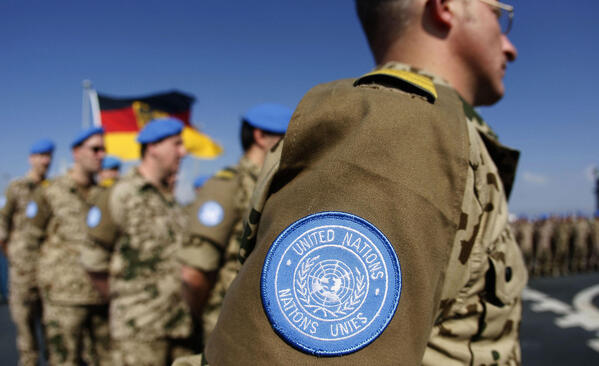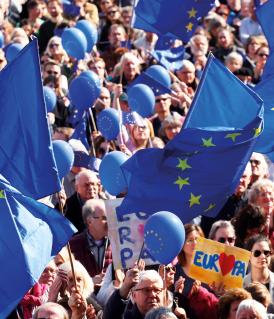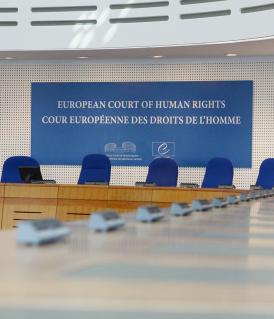Commitment to peace and security

What is the basis for Germany’s commitment to peace and security?
Germany’s global commitment to peace and security, promoting human rights Human rights The respect and strengthening of human rights worldwide are a cornerstone of German Federal Government policy. Together with its EU partners it is committed to protecting and continually advancing human rights standards throughout the world. This occurs in close collaboration with the institutions… Read more › and protecting minorities are unchanging foundations of its foreign policy and are rooted in the Basic Law The Basic Law The Basic Law determines that Germany is a constitutional state: All state authorities are subject to judicial control. Section 1 of the Basic Law is of particular relevance. It stipulates that respect for human dignity is the most important aspect of the constitution: “Human dignity shall be… Read more › . On the one hand, Germany accepts this duty out of recognition of its historical responsibilities. On the other hand, it is in Germany’s interest to prevent crises and manage conflicts, as the effects of crises may be felt around the world, including in Germany. Russia’s illegal war of aggression against Ukraine gravely undermines international security and stability in Europe.
Germany’s multilateral links form the basis for its foreign policy activity. For example, deployments of the Bundeswehr, the German armed forces, always take place within systems of collective defence or security. Above all, these involve international organisations such as the United Nations (UN), the European Union (EU) or the North Atlantic Treaty Organization ( NATO Nato The North Atlantic Treaty Organisation was founded in 1949. The defence alliance now includes 31 countries, and Germany has been a NATO member since 1955. The Federal Armed Forces have taken part in various NATO missions. NATO is based in the Belgian capital Brussels. → nato.int Read more › ). The Bundestag The Bundestag The Bundestag is made up of the elected representatives of the German people. In principle elections to the Bundestag are proportionally representative, with each party’s share of the vote in the election reflecting the number of seats it occupies in the parliament. But the electoral system also… Read more › must also approve deployment of the Bundeswehr abroad. For this reason, the German armed forces are considered a parliamentary military force.
Why does Germany place an emphasis on crisis prevention?
The German government always priorities civilian measures, the primary goal being to identify crises and conflicts at an early stage and to defuse them before they can escalate. Since 2017, the guidelines on “Preventing Crises, Resolving Conflicts, Building Peace” drawn up under the auspices of the Federal Foreign Office have underpinned activities aimed at peace, security, freedom and prosperity.
An increasing focus is on new threats to global security in cyberspace. The German government is addressing these wide-ranging challenges with a National Security Strategy based on a comprehensive definition of security that encompasses all aspects of human security.
What is the National Security Council?
A National Security Council established in 2025 will have the following tasks:
- coordinating the main issues relating to an integrated security policy
- providing strategic development and foresight
- jointly assessing situations
- acting as the body for joint political will formation
A Federal Government Federal Government The Federal Government and cabinet is made up of the Federal Chancellor and the Federal Ministers. While the Chancellor holds the power to issue directives, the ministers have departmental powers, meaning that they independently run their respective ministries in the framework of those directives… Read more › National Crisis Unit spanning federal, state and ministerial levels and a National Situation Centre at the Federal Chancellery will ensure that crises are tackled holistically.
How does Germany assume responsibility in NATO?
Ever since the formation of the Bundeswehr in 1955, Germany has been integrated into NATO Nato The North Atlantic Treaty Organisation was founded in 1949. The defence alliance now includes 31 countries, and Germany has been a NATO member since 1955. The Federal Armed Forces have taken part in various NATO missions. NATO is based in the Belgian capital Brussels. → nato.int Read more › (North Atlantic Treaty Organization) both politically and militarily. Germany’s place at the heart of the north Atlantic alliance is part of the DNA of German foreign policy. Collective defence is the most important principle of the alliance: its member states pledge to protect one another and to respond jointly in the event of a conflict. NATO currently has 32 member states.
The Bundeswehris a major provider of NATO troops, taking part in international missions and alliance defence activities. For example, Germany has contributed to the NATO KFOR security force in Kosovo since 1999. In Lithuania, German armed forces are also taking a leading role as a “framework nation” to help secure NATO’s eastern frontier. This is part of the enhanced Forward Presence mission (eFP), which contributes to safeguarding Eastern European states. Germany is supporting the close cooperation between NATO and the European Union European Union In 1957, Germany was one of the six founding members of today’s EU, along with France, Italy, Belgium, the Netherlands and Luxembourg. The EU is currently made up of 27 states; the euro is the official currency in 20 of them. For Germany, European integration forms the basis for peace, security and… Read more › .
How much does Germany spend on defence?
In the context of Russia’s illegal war of aggression against Ukraine, the German government set up a special fund for the Bundeswehr worth 100 billion euros in 2022. Germany provides Ukraine with financial support, weapons and humanitarian assistance. The German government also welcomes the decision taken by NATO Nato The North Atlantic Treaty Organisation was founded in 1949. The defence alliance now includes 31 countries, and Germany has been a NATO member since 1955. The Federal Armed Forces have taken part in various NATO missions. NATO is based in the Belgian capital Brussels. → nato.int Read more › in June 2025 to increase member states’ defence expenditure to 5 percent of their respective GDP by 2035 at the latest – with 3.5 percent to go on direct military spending and 1.5 percent on military infrastructure. Germany is thus modernising the equipment used by the Bundeswehr and strengthening its national defences and those of its allies so that the Bundeswehr can make a key contribution to NATO’s deterrence and defence capabilities. The aim is also to ensure that Germany and Europe can guarantee their own security to a much greater extent.
What role does Germany play as a member of the United Nations?
Since joining the United Nations United Nations The United Nations (UN) has a key role to play in the international system. Germany has been a UN member since 1973. Since joining, Germany has taken on more and more responsibility and is now one of the largest donors and supporters of the United Nations. For example, Germany is the second largest… Read more › in 1973, Germany has been a committed, reliable and valued member of this global organisation. It is also the fourth-largest contributor to the UN general budget. In 2024, Germany provided around 219 million US dollars, accounting for 6.1 percent of the budget. Germany is likewise the fourth-largest contributor to the budgets of the individual peacekeeping missions, which it supports in a variety of ways - including stabilisation measures, diplomatic mediation efforts and post-crisis management. It also makes troops, police officers and highly qualified personnel available to the missions.
Does the United Nations have a representation in Germany?
The United Nations United Nations The United Nations (UN) has a key role to play in the international system. Germany has been a UN member since 1973. Since joining, Germany has taken on more and more responsibility and is now one of the largest donors and supporters of the United Nations. For example, Germany is the second largest… Read more › (UN) has numerous branches in Germany. The UN High Commissioner for Refugees (UNHCR) opened a regional office in Bonn in 1951. Today there are around 30 UN organisations in Germany, especially on the UN Campus in Bonn, which is home to more than 20 institutions.
In which other peace organisations is Germany active?
Another essential pillar upholding peace and security is the Organization for Security and Co-operation in Europe ( OSCE OSCE With its 57 member states, the Organization for Security and Co-Operation in Europe (OSCE) is a comprehensive forum for cooperation at the pan-European level. OSCE missions are active above all in conflict prevention and management. Germany makes a substantial contribution to finance and man-power… Read more › ), which Germany supports in intensive and varied ways.
The Center for International Peace Operations (ZIF) established by the Federal Government Federal Government The Federal Government and cabinet is made up of the Federal Chancellor and the Federal Ministers. While the Chancellor holds the power to issue directives, the ministers have departmental powers, meaning that they independently run their respective ministries in the framework of those directives… Read more › and the Bundestag The Bundestag The Bundestag is made up of the elected representatives of the German people. In principle elections to the Bundestag are proportionally representative, with each party’s share of the vote in the election reflecting the number of seats it occupies in the parliament. But the electoral system also… Read more › in 2002 also works to help prevent crises and consolidate peace around the world. Working on behalf of the Federal Foreign Office, the ZIF trains civilian experts and supplies personnel for peace and election observer missions. Over the course of 20 years, it has sent out around 6,000 of these people to monitor elections Elections Every four years, the parties stand in the general elections to the Bundestag. Traditionally, the turn-out is high in Germany, and following a high in the 1970s, when the turn-out was over 90 percent, since reunification it has been around 80 percent. 76.6 per cent of eligible voters took part… Read more › .
How does Germany promote disarmament and arms control?
Germany is making an important contribution to global security through its commitment to disarmament and arms control. The Federal Government Federal Government The Federal Government and cabinet is made up of the Federal Chancellor and the Federal Ministers. While the Chancellor holds the power to issue directives, the ministers have departmental powers, meaning that they independently run their respective ministries in the framework of those directives… Read more › is working towards a world free of nuclear weapons, based on the foundation of the Treaty on the Non-Proliferation of Nuclear Weapons (NPT). In addition, Germany is campaigning to promote the universality and enforcement of international treaties and agreements relevant to this area, such as the Chemical Weapons Convention, which codifies rules prohibiting the use of chemical weapons. Germany is also actively involved in promoting the global ban on mines and cluster munitions. Specifically the Federal Government is supporting humanitarian efforts to clear mines and weapons and to care for victims.


